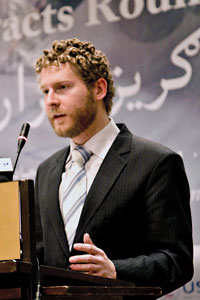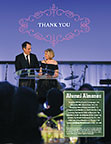Law on a Wild Frontier
Printer Friendly Version Tom Rosenstock ’05 ran with the bulls in Pamplona, climbed Mount Kilimanjaro, and once flew from New York to Qatar on four days’ notice to visit a pal in the army. “He came halfway around the world just to have a beer,” says the friend, Trayce Slumsky. So what might seem an unbelievable move for anyone else was right in character for Rosenstock: While traveling in the Middle East two years ago, he decided to stay in Afghanistan and open a law practice. “There’s a whole wide world out there. Why would I live in one part of it?” Rosenstock asks. “It’s like living in half of your house.”
Tom Rosenstock ’05 ran with the bulls in Pamplona, climbed Mount Kilimanjaro, and once flew from New York to Qatar on four days’ notice to visit a pal in the army. “He came halfway around the world just to have a beer,” says the friend, Trayce Slumsky. So what might seem an unbelievable move for anyone else was right in character for Rosenstock: While traveling in the Middle East two years ago, he decided to stay in Afghanistan and open a law practice. “There’s a whole wide world out there. Why would I live in one part of it?” Rosenstock asks. “It’s like living in half of your house.”
These days, he calls his house Maison Kabul. It is spartan but spacious, with brightly painted halls and a garden. Rosenstock, 31, shares it with a French diplomat and two expats from Canada and Poland, and exuberantly entertains an array of journalists, diplomats, and relief workers. Last year, he prepared a 24-pound bird for Thanksgiving and a 16-pound ham for Easter. And indeed, he filled both halves of Maison Kabul with friends.
Rosenstock’s sense of adventure grew out of his international upbringing. His late father, Robert, was a foreign service diplomat and legal adviser to the United Nations, stationed in Geneva part-time. His mom, Gerda, is Austrian. In 2000, he received his B.A. in business from Washington University, where he started and ran a moving and storage company for three years during summer breaks. He also worked in construction and freelanced for the global management-consulting firm Accenture. “I’d like to try out every job before I die,” Rosenstock says. In Kabul, he even joined a military convoy to experience firsthand the life of a mercenary.
Debating between attending business or law school, he chose NYU Law for its reputation in international law. “He was a very strong student, a good writer, and also resourceful,” says Professor Emeritus Andreas Lowenfeld, who hired him as his research assistant. After graduation, Rosenstock spent nearly three years as a corporate associate at Paul, Weiss, Rifkind, Wharton & Garrison. Chafing under the strictures of big-firm life, he left in January 2008 to travel. He added Afghanistan to his itinerary on the advice of a friend. “I only planned to stay a week. But on day eight, I didn’t feel like buying a plane ticket, and on day nine, the same,” he says. “Everyone in the U.S. was talking about the war. Here I was in Kabul, right in the middle of it.” With both Afghan and international companies rushing to rebuild the country, billions of dollars’ worth of reconstruction contracts were in play—so he hung a shingle.
Most of Rosenstock’s work focuses on contract negotiations for Afghan companies. Because the spoken word is more important than the written word among Afghan businessmen, and “a functioning court system is somewhere between a rumor and a fairy tale,” Rosenstock says, contracts are nonexistent or ignored. “When the U.S. hires an Afghan subcontractor, it throws a pretty sophisticated contract on the table. My job is to help my client understand and negotiate it,” he says. He also works the other side, advising U.S. companies doing business in Afghanistan. Rosenstock is not licensed to practice Afghan law, however, so he works with local attorneys. Last year, he helped an Afghan construction company recoup $2 million, which the client then used to pay hundreds of laborers who might otherwise have turned to opposition groups to support themselves. “I’ve found the ideal organizational structure: a one-man operation in a war zone,” he says. “It’s also rewarding to know that the people I’m helping don’t necessarily have another option.”
—
All of 2010 Alumni Almanac

 Multimedia
Multimedia